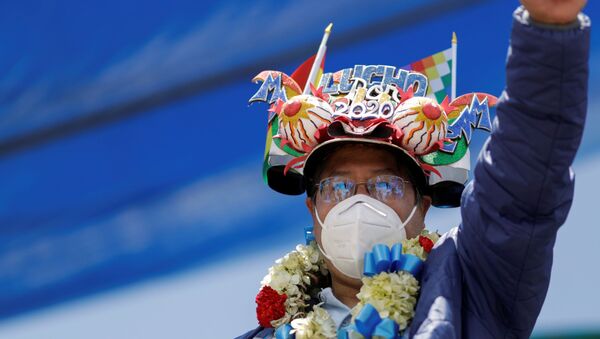Bolivia's newly-elected president, Luis Arce, has demanded the head of the Organisation of American States (OAS) resign over his role in the 2019 coup d'etat.
Arce, Movement for Socialism (MAS) leader, said on Saturday OAS Secretary-General Luis Almagro should go for "moral and ethical reasons."
“We do not agree that an important body should be in the hands of people who support a particular political party or political trend in the region, and that it interferes in the internal affairs of a country," Arce said. "If it was able to do that in Bolivia, imagine, you could do it with any other country, and we can’t allow that.”
Almagro oversaw the OAS audit of last year's presidential election that overturned president Evo Morales' landslide victory in the first round. Morales, Latin America's first fully-indigenous leader, reluctantly invited the OAS to validate the count after a wave of opposition rioting over alleged ballot fraud and violent attacks on MAS politicians.
That included the shocking attack on Patricia Arce Guzman, the mayoress of the town of Vinto. Opposition rioters dragged her from the municipal offices before setting them on fire, then cut her hari, painted her face red and forced her to walk barefoot through the town as they spat and urinated on her. Arce Guzman was elected a senator last week.
— Max Blumenthal (@MaxBlumenthal) October 24, 2020
"There was no fraud, there was a whole preparation for a coup, of which the OAS was unfortunately a part," Arce told La Razón in reference to the audit, adding that Almagro “interfered, violated Bolivian regulations, and those of any international body observing an electoral process; he interfered in internal affairs.”
Other Latin American government officials laid into Almagro this week.
Venezuelan UN envoy Samuel Moncada pointed out Almagro's dishonesty in claiming at the OAS General Assembly in Washington this week: "We told Evo Morales not to quit"
"Almagro has no shame, he represents the ideological, political and moral ruin of the OAS on the continent." Moncada wrote. "Never more will this kind of criminal be able to deceive our peoples!"
— Samuel Moncada (@SMoncada_VEN) October 24, 2020
Mexican undersecretary of foreign affairs Maximiliano Reyes Zúñiga accused Almagro on Tuesday of making “factious” use of the OAS electoral observer mission in 2019 to legitimise the opposition fraud claims.
And on Wednesday the Puebla Group, whose members include former presidents of Bolivia, Brazil, Ecuador, Uruguay and Spain, published an open letter urging Almagro to resign.
— Camila (@camilateleSUR) October 21, 2020
He has been a constant critic of Venezuelan President Nicolas Maduro and his government, even attacking the country's National Electoral Council after the opposition failed to gather enough signatories for a presidential recall referendum. In 2016 he invoked the Inter-American Democratic Charter against Caracas, claiming there had been "an alteration of the constitutional order" there.
In 2018 Almagro led efforts to bring Maduro and other Venezuelan leaders to trial at the International Criminal Court in The Hague. In 2019 he revived the doctrine of "Responsibility to Protect" - previously used to justify the 2003 invasion of Iraq - to urge other states to intervene in Venezuela.
Nicaragua's elected government has also been an occasional target for Almagro. In 2019 he sought to invoke the Democratic Charter against Daniel Ortega's Sandinista government.
Just this week at the OAS meeting in Washington, the secretary-general warned Managua the bloc would not recognise the result of next November's presidential election if it did not comply with a list of demands.
"Daniel Ortega will have to demonstrate how independent he is from the bad practices that Cuba and the Bolivarian regime [in Venezuela] instigate," Almagro said.
A group of 14 OAS members, led by the US, voted to expel Cuba from the bloc in January 1962. In response, revolutionary leader Fidel Castro dubbed the organisation the “Yankee Ministry of Colonies and a military bloc against the peoples of Latin America.”
Even after the OAS voted to allow Cuba to re-join in 2009, the island nation has consistently refused to do so.




